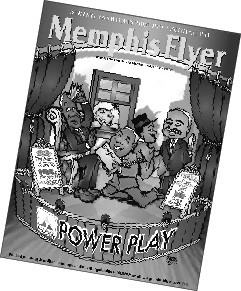MLGW just wants to give us a little credit. ¶ Actually, it wants to give natural-gas customers an average $50 in credit, to be exact. After charging consumers for a pre-pay natural-gas buy, MLGW is planning to issue a $25 million refund next month. In order to receive a discount on a winter gas supply, MLGW planned to buy natural gas from the Tennessee Energy Acquisition Corporation during the summer months. But a recent audit suggested the utility should have gotten a short-term loan instead of slowly amassing the funds through ratepayer contributions.
And for a company already struggling with an image problem, even giving back can become a controversy.
At a City Council committee meeting last week, some council members wanted the utility company to mail its natural-gas customers a refund check to restore public confidence.
“We are consistently telling people their meter is right, yet you have been charging them for gas they’re not using,” said Councilwoman Barbara Swearengen Ware. “It may cost you some money to restore their confidence. My constituents don’t trust a credit on their bill.”
But MLGW auditor Lesa Walton said mailing refund checks to the utility’s roughly 360,000 natural-gas customers would cost $284,000.
There are other problems with issuing checks. About 2 percent of the utility’s bills are returned each month. And let’s face it, if you tell everyone in the city that the utility is going to be sending out $50 checks, you might as well make it open season on mailboxes.
“Common sense dictates that you don’t want to spend $284,000 to write a check when you can issue a credit,” said council member Jack Sammons. “We would have $25 million scattered in mailboxes all over town. I think we’ve lost all common sense … if we tell them to issue checks.”
Given the risk of theft and the cost, I think issuing $25 million in checks is a spectacularly bad idea, but I understand Ware’s point of view.
Right now, it’s the middle of May. Soon, air conditioners will be running full blast. The credit is only for natural-gas customers, but those customers may see their $50 credit quickly eaten up in high electricity bills. Will those people really feel like they got their money back?
I’m not sure there’s any way for the utility we love to hate to restore the public’s trust. But putting cold, hard cash back into ratepayers’ hot little hands would certainly help.
Without the audit, the average MLGW customer would never have known about any pre-payment plan. (In fact, council members kept trying to find out who exactly made the decision to pass that cost onto customers but were repeatedly thwarted by attorneys for both MLGW and the council.) Even if a ratepayer somehow heard about a pre-payment charge — applied over several months and slipped in as part of the purchased gas adjustment (PGA) — they would have been hard-pressed to find it itemized on their bill.
The council approves the base MLGW natural-gas rate. Because the natural-gas market is no longer regulated, the PGA is added to account for the fluctuating cost of natural gas as well as the cost of storage, transportation, and delivery. The utility calls the PGA a cost-recovery mechanism, but I call it passing costs onto the consumer. Which is fine, until you find out you don’t know what you’re paying for.
A savvy consumer could have gone to MGLW’s Web site and seen that the base price of gas is roughly 72 cents per ccf (hundreds of cubic feet) plus the PGA. From September 2006 to April 2007, however, the PGA ranged from a high of almost 57 cents per ccf (in November) to a low of 13 cents (in April).
The pre-payment amounted to about 5 percent of the PGA, but if that’s somewhere on the Web site, I couldn’t find it. And if you want to know how much of the PGA is commodity costs or transportation costs, good luck.
Each customer’s credit will depend on their household’s usage of natural gas for the past eight months, so the amount of each credit will vary. But, unless the credit comes with an easy-to-understand chart and a billing history, customers have no way of really knowing if the amount they get is the amount they paid.
I guess we have to trust them. Utility staff say they’re working on transparency, and I’ll give them credit for that. Of course, they’ll have to take my word for it.
 Greg Cravens
Greg Cravens  Greg Cravens
Greg Cravens 